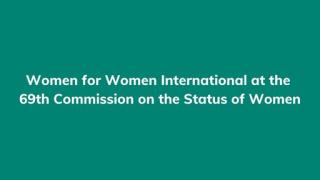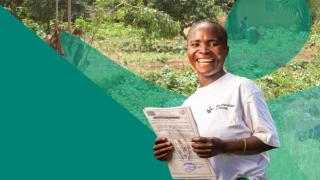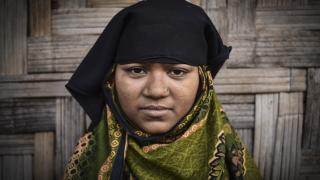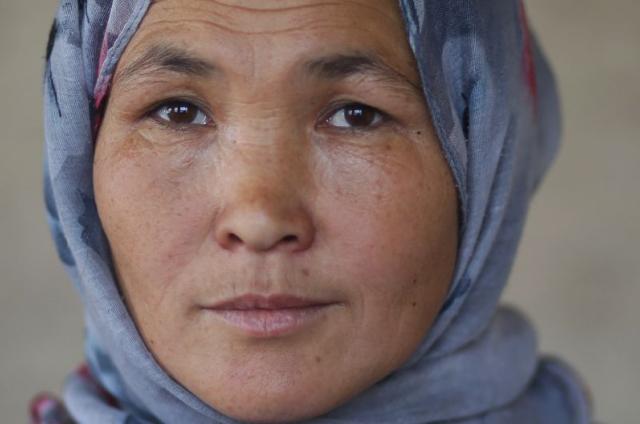CSW69: One Month Later
CSW69: One Month Later
As we strategised about our engagement with the 69th session of the Commission on the Status of Women (CSW69), we saw it as more than another event.
CSW is a UN Women-led space that brings together governments, international institutions, women’s rights organisations, leaders, activists and donors looking to advance gender equality.
Coming 30 years after the landmark Beijing Platform for Action, CSW felt like a once-in-a-generation opportunity - an invitation for bold thinking, for reshaping decision-making spaces, and for shifting the dial on whose expertise is recognised and integrated into peacebuilding and the broader Women, Peace and Security (WPS) agenda.
So, last year we put our heads together with community advocates - women who have participated in Women for Women International’s Change Agent programme - and with many women’s rights organisations (WROs) across conflict-affected contexts. Together, we co-created our most ambitious advocacy project to date: “From Asking to Action: ensuring the voices of women affected by conflict are heard".
We consulted with 6,500+ women across 14 countries. These women shared their visions for the future, and the strategies needed to secure it, and as we came together for CSW69 to reflect on the progress made in the 30 years since the Beijing Declaration and Platform for Action was adopted, it was an ideal platform to amplify their visions and solutions.
Framing the Current Context
Conflict is on the rise and lasting longer
The lead-up to CSW69 was marked by escalating violence and displacement in many of the countries where Women for Women International works. Today, conflict and crisis are more acute and fragmented than ever. We see this across all the contexts Women for Women International operates in - from the crisis in eastern DRC to ongoing violence in Sudan where conflict-related sexual violence is widespread, to the continued deterioration of women’s rights in Afghanistan, and the violation of the ceasefire agreement in Gaza. And sadly, this list is far from exhaustive. Not only is conflict worsening, but the tools we rely on to address its root causes - especially gender inequality - are being dismantled and disregarded.
Funding is decreasing
Through From Asking to Action, we heard loud and clear that there is a critical need for flexible and direct funding for women-led and women-focused organisations, and for programmes that address barriers to women’s participation at all levels of decision-making. In fact, 75% of the women we consulted called for increased funding and resources - particularly for gender-sensitive aid.
Yet what has 2025 looked like so far? Funding has been slashed. Major donors - including the UK and US - have reversed their commitments to promoting peace and advancing gender equality - including through rolling back their commitments to civil society and women’s rights organisations. These cuts clearly reflect a prioritisation of militarisation over long-term peacebuilding, security, and gender equality.
Gender Justice in Global Retreat
This funding deficit is unfolding alongside a wider retreat from multilateralism and the rise of authoritarian and isolationist ideologies. Feminist movements, coalitions and networks are increasingly facing backlash for their efforts to advance gender equality and human rights. Despite rhetorical support for women’s leadership in peace and security, the necessary political will to enact transformative change remains limited. Women in conflict-affected contexts continue to be excluded from decision-making spaces, and their expertise is too often undervalued or ignored. This also highlights a broader issue we won’t unpack here: the challenge of holding key decision-making conferences like CSW in the Global North, rather than in regions where the Global Majority live.
What Did This Mean for our Participation at CSW69?
A time for co-facilitation and meaningful change
This turbulence meant that - more than ever - this was a time to co-facilitate meaningful conversations at a number of public and private events and meetings with women’s rights leaders - centering their solutions and their expertise and to open difficult but necessary discussions with decision-makers, allies, and peers. Across all of these discussions, partners consistently underscored the devastating effects of the funding crisis and lack of global attention on conflict contexts.
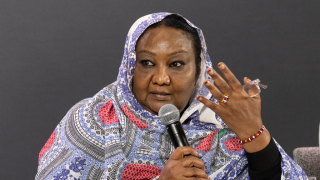
Fatima Ahmed, Executive Director of Zenab for Women in Development in Sudan, shared the immense scale of suffering experienced by people - especially women and girls - highlighting that, despite the fact that Sudan is the largest humanitarian crisis in the world, it remains largely overlooked:
"...the crisis in Sudan is really a forgotten crisis, [people are] paying no attention in terms of media and in terms of resources. This is making it very complicated on the ground for the suffering of women and children and all Sudanese people..."
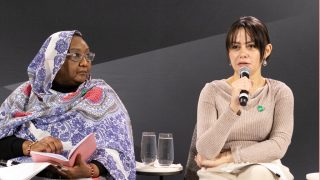
Colleagues and partners contextualised what shrinking civic space and the rollback of women’s rights can look like for women human rights defenders. Nisren Habib, Research Manager at Women Now for Development, used her real name in public for the first time following the fall of the Assad regime in Syria. For years, her safety depended on anonymity due to the nature of her work documenting regime violations.
She shared: "Over the course of the 14 years I never mentioned or published my name… I used to write under other nicknames. My family never knew what I was doing since 2012 and all this because I was doing work for documenting violations done by the Al Assad regime and other parties. [Violations] like forced displacement, besieging, [the use of] chemical weapons. To protect myself and also to protect my family [I could not use my name]..."
...if the Al Assad regime knew that their daughter was working on such things my family would be detained or I would be killed… Just for saying freedom loudly you would be disappeared or killed.
Colleagues also emphasised the importance of language and framing in communicating the nuanced and varied impact of rollback in conflict contexts. For Amani Mustafa, Women for Women International - Palestine Country Director, who lives and works in the West Bank in Palestine, and with partners in Gaza the overarching message we heard was to steer away from calling women who are living through the occupation of Gaza ‘resilient’. The horrors of the crisis in Gaza must not be normalised and the ability of women to withstand these horrors should not be normalised nor expected. In Amani’s own words:
Let’s be clear: resilience is not a substitute for justice. It is a human response to trauma, not a badge of honour for those who should never have been put in harm’s way. This term has been overused, romanticised, and often weaponised.
Amani continues: "…We've been seeing women so exhausted from the war in Gaza and occupation of the West Bank… We must not stop talking about them but remain faithful to their suffering, and we need to elevate their suffering and amplify their voices…we should not waste an opportunity [like CSW 69] where we should be present."
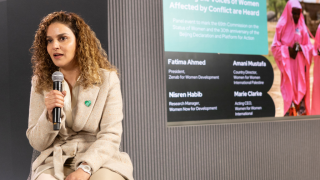
The Road Ahead
Time to rethink our role
Thirty years since the Beijing Platform for Action, CSW69 arrived at a time of funding cuts and the erosion of multilateralism. This moment demanded that we rethink our role - as convenors, as dismantlers, and as co-conspirators.
One month on from CSW69 we’re looking ahead to 2025 with sharpened tools - it’s time to push forward with activists and experts, to continue claiming back and sharing space that’s being seized from feminist movements. As Amani says:
For the women that we serve, we should always continue to be fuelled by the courage of conviction and the belief that there will be a change one day.
Find out more
Our engagement at UN CSW 69
subtitle:
Against the backdrop of growing inequality, rising insecurity and a mounting rollback on women’s rights – Women for Women International is taking action at this year's CSW - read more!
Global Policy and Advocacy
subtitle:
At Women for Women International, we are working towards a world where power systems and structures are transformed to better uphold and protect the rights of women affected by conflict and ensure their meaningful participation in the decisions, policies, and laws that affect them.
Conflict Response Fund
subtitle: In 2018, we launched a new conflict response fund — a separate funding pool to more rapidly help women who are caught in the current horrors of our time. To reach women in their most critical moments, we work with partners who can respond to conflict and
In 2018, we launched a new conflict response fund — a separate funding pool to more rapidly help women who are caught in the current horrors of our time. To reach women in their most critical moments, we work with partners who can respond to conflict and make an immediate impact.

